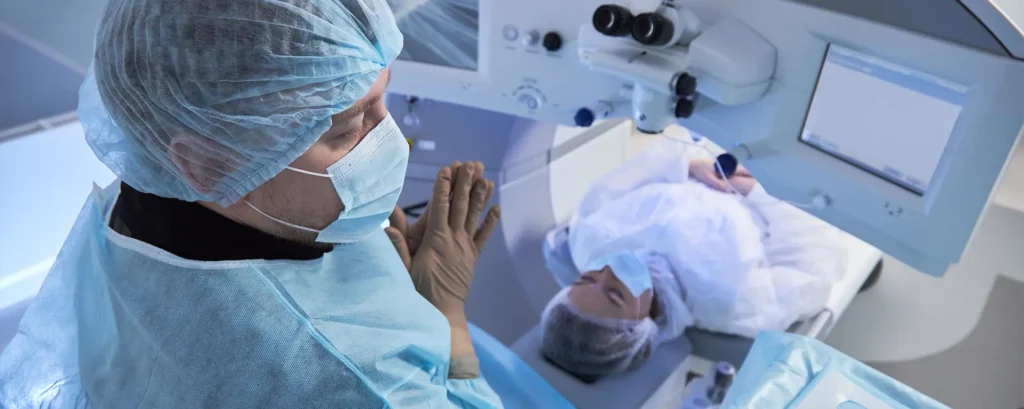If you take aspirin regularly — especially a low-dose daily tablet to protect your heart — you might feel a bit anxious when cataract surgery is on the horizon. You’ve probably heard mixed advice from friends, online forums, or even different doctors. Some people say you should stop aspirin before surgery to prevent bleeding, while others insist you should carry on taking it to reduce your risk of heart attack or stroke.
So, which is it? Should you stop or continue aspirin before cataract surgery? The answer isn’t as simple as a quick “yes” or “no” — it depends on why you’re taking aspirin, your overall health, the type of surgery you’re having, and your surgeon’s preferences. In this article, we’ll go through what aspirin does, why it’s prescribed, how it interacts with cataract surgery, and what current guidelines suggest. By the end, you’ll feel more confident about having that conversation with your eye surgeon.
Why Aspirin is Commonly Prescribed
Aspirin (acetylsalicylic acid) is more than just an over-the-counter painkiller. At low doses — usually 75mg to 100mg per day — it works as an antiplatelet medicine. That means it reduces the ability of your blood to clot. This is particularly useful for people who have a high risk of cardiovascular problems such as heart attack, stroke, or blood clot formation.
Doctors often recommend long-term low-dose aspirin if you’ve had a heart attack, have angina, have undergone heart bypass surgery, have had a stent placed in your arteries, or have a history of stroke or transient ischaemic attack (TIA). In some cases, it’s also given to people with certain heart rhythm problems or high-risk diabetes.
The aim is straightforward — to keep your blood “slippery” enough to reduce the chances of clot formation that could block critical arteries. But the very thing that makes aspirin beneficial for your heart can sometimes be a concern for surgeons, because it can slightly increase bleeding during and after operations.
What Happens During Cataract Surgery

Cataract surgery is one of the most common and successful surgical procedures in the world. In the UK, it’s usually done under local anaesthetic — meaning you’re awake, but your eye is numbed — and takes around 10–20 minutes. The cloudy lens in your eye is removed and replaced with a clear artificial one.
The surgical incision is tiny — often just 2–3 millimetres — and doesn’t usually require stitches. Because the wound is so small and the surgery is minimally invasive, bleeding risk is generally low compared with many other types of surgery. That’s why for many patients, aspirin may not need to be stopped.
However, there are certain situations in cataract surgery where bleeding can be more of a concern, and in those cases, aspirin use is discussed more carefully between the patient, surgeon, and sometimes a cardiologist.
How Aspirin Affects Surgical Bleeding
Aspirin affects platelets — the tiny cells that help your blood clot after injury. By making them less “sticky,” aspirin can prolong the time it takes for bleeding to stop. In everyday life, this is usually not a problem. But in surgery, it can theoretically increase the risk of bleeding inside the eye, particularly in areas such as the conjunctiva or the more delicate deeper structures.
In cataract surgery, the most common bleeding issue linked to aspirin is subconjunctival haemorrhage — a small bleed under the clear membrane covering the white of the eye. This looks alarming (red patch on the eye) but is almost always harmless and clears within a week or two.
Serious bleeding inside the eye, such as suprachoroidal haemorrhage, is extremely rare but can be sight-threatening. Some studies have found no significant increase in these risks for cataract patients who continue aspirin, while others suggest a tiny rise in certain bleeding complications.
What the Research Says About Continuing Aspirin

Multiple studies over the past two decades have looked at whether continuing aspirin increases the risk of complications during cataract surgery. Most have found that the benefits of continuing aspirin — especially for those with a high cardiovascular risk — outweigh the small risk of bleeding.
For example, research in large patient groups has shown that stopping aspirin before cataract surgery can lead to avoidable heart attacks or strokes in at-risk individuals. On the other hand, keeping aspirin going may lead to minor bleeding on the eye surface, but not to serious loss of vision.
This is why many current ophthalmology guidelines lean towards continuing aspirin for routine cataract surgery in most patients, while making exceptions for unusual cases.
When Your Surgeon Might Recommend Stopping Aspirin
Although most people are advised to keep taking aspirin before cataract surgery, there are situations where stopping it temporarily may be safer. For example:
- If you’re on multiple blood-thinning medications – Combining aspirin with other antiplatelet or anticoagulant drugs (such as clopidogrel or warfarin) may increase bleeding risk.
- If you have a history of bleeding disorders – Such as haemophilia or severe platelet problems.
- If your surgery is complex – For example, if you have advanced cataracts, zonular weakness, or a high likelihood of needing a larger incision.
- If you’re undergoing combined eye procedures – Such as cataract surgery with glaucoma surgery, which can involve more delicate tissues and a higher bleeding risk.
In these cases, your surgeon may work with your GP or cardiologist to decide on the safest course — sometimes pausing aspirin for a few days before and restarting it soon after.
The Role of Your Cardiologist or GP

Your ophthalmologist is the expert in eye surgery, but your cardiologist or GP understands your cardiovascular risk better than anyone. If there’s any uncertainty about whether you should stop aspirin before cataract surgery, your eye surgeon will often consult your medical team.
They’ll weigh up:
- The reason you’re on aspirin in the first place.
- How long you’ve been taking it.
- The risk of bleeding versus the risk of a cardiovascular event if you stop it.
This collaborative approach ensures you get the safest outcome for both your eyes and your overall health.
Timing If Aspirin Needs to Be Stopped
If it’s decided you should stop aspirin before surgery, it’s usually stopped about 5–7 days in advance. That’s because aspirin’s effect on platelets lasts for their entire lifespan (around 7–10 days). After stopping, your body gradually replaces affected platelets with new ones that can clot normally.
You’ll typically restart aspirin as soon as your surgeon feels it’s safe — often the day after surgery, or within a few days if there are no complications. The exact timing depends on your surgery, your bleeding risk, and your cardiovascular history.
Why You Should Never Decide on Your Own
It’s tempting to think, “I’ll just stop aspirin a few days before surgery to be on the safe side.” But stopping aspirin suddenly — especially if you’re taking it for heart or stroke prevention — can significantly raise your risk of a serious cardiovascular event. In some people, this rebound effect can happen within days.
That’s why you should never change your medication without talking to your surgeon and your GP or cardiologist. Even for something that feels “low risk” like cataract surgery, the bigger picture of your health must be considered.
Preparing for Cataract Surgery If You’re on Aspirin
If you’re taking aspirin and have cataract surgery scheduled, here’s how to prepare:
- Tell your surgeon about your aspirin use at your pre-operative assessment.
- Be clear about why you take it (heart attack prevention, stroke history, stent, etc.).
- Bring a list of all medications you’re taking, including herbal supplements and over-the-counter drugs.
- Ask if you should continue aspirin or if there’s a plan to pause it.
- Follow their instructions exactly — don’t adjust the dose or stop early unless told to.
FAQs: Aspirin and Cataract Surgery
- Is it safe to keep taking aspirin before cataract surgery?
For the majority of patients, continuing low-dose aspirin before cataract surgery is considered safe. Modern cataract techniques use tiny incisions and cause minimal bleeding, so the risk of serious complications is very low. The main reason to keep taking aspirin is to protect you from heart attacks or strokes, particularly if you’ve already had one or are at high cardiovascular risk. While you might notice a small red patch on the white of the eye afterwards (a subconjunctival haemorrhage), this is harmless and fades within a couple of weeks. Your surgeon will look at your personal health history before confirming the best option. - Can aspirin cause blindness during cataract surgery?
The fear of going blind from bleeding during cataract surgery while on aspirin is understandable but not supported by evidence for routine cases. The most likely bleeding issue from aspirin is superficial — under the clear membrane on the white of the eye — and it does not affect your sight. Very rarely, bleeding inside the eye can occur, but this is uncommon and often linked to other high-risk factors rather than aspirin alone. Surgeons are trained to manage bleeding should it happen, making the overall risk to your vision extremely low. - Should I stop aspirin if I’m only taking it occasionally?
If you take aspirin now and then for pain relief rather than for heart or stroke prevention, your surgeon may prefer you to avoid it for several days before surgery. This is because its blood-thinning effect lasts for the lifespan of the platelets it affects — roughly a week — and pausing it can help reduce even minor bleeding. However, you should still let your surgeon know exactly when you last took aspirin, as this can influence their surgical planning and the advice they give you. - How long before cataract surgery should aspirin be stopped, if needed?
In the uncommon situations where aspirin needs to be paused, it is usually stopped around 5–7 days before surgery. This allows your body time to replace affected platelets with new ones that can clot normally. The timing is important — stopping it too far in advance can increase your risk of cardiovascular events, and stopping it too late may not reduce bleeding risk at all. Your surgeon will give you an exact date for your last dose if this approach is necessary. - Will I need to restart aspirin after surgery?
Yes, if you normally take aspirin for ongoing heart or stroke protection, restarting it is important. Many surgeons advise resuming it within 24 hours after surgery if there are no complications, while others may suggest waiting a couple of days to be sure there’s no risk of delayed bleeding. Your post-operative check-up is the perfect time to confirm the safest restart point, and you should follow your surgeon’s instructions carefully to avoid both clotting and bleeding problems. - What if I’m also on warfarin or another blood thinner?
Being on aspirin alongside another anticoagulant such as warfarin, apixaban, or clopidogrel requires extra care. This combination increases the risk of bleeding, even in low-risk surgeries like cataract removal. Your surgeon will usually coordinate with your GP or specialist to decide if adjustments are needed to one or both medications. Sometimes, only one of the drugs is paused, or the timing of your procedure is adjusted to keep you safe. It’s essential to disclose all medications well ahead of your operation. - Can aspirin increase swelling after cataract surgery?
Aspirin itself does not directly cause swelling inside the eye, but it can lead to a little more bleeding in some cases, and that blood can trigger temporary inflammation. This type of swelling usually responds well to the anti-inflammatory eye drops given after surgery and doesn’t have a lasting impact on your vision. Most patients on aspirin recover at the same pace as those not taking it, provided they use their prescribed drops consistently and attend all follow-up appointments. - Does aspirin affect cataract surgery recovery time?
For most people, aspirin use doesn’t make recovery from cataract surgery longer. You can expect vision to start improving within a few days, with most healing complete within four to six weeks. Minor surface bleeding from aspirin does not interfere with visual recovery and generally clears up on its own. The key to smooth healing is following all aftercare advice, avoiding eye rubbing, and reporting any unusual changes — like a sudden drop in vision — promptly to your surgeon. - Can I switch to a different blood thinner before surgery?
Sometimes patients ask if they can switch from aspirin to another type of blood thinner before cataract surgery to reduce bleeding risks. This is rarely done just for eye surgery, because any change in your antiplatelet or anticoagulant therapy carries its own dangers. If there is a strong reason to make a change, it must be agreed upon by your cardiologist or GP, not just your eye surgeon. Such changes are carefully timed and monitored to avoid increasing your risk of a heart attack or stroke. - Will the anaesthetic be different if I’m on aspirin?
In most cases, no — cataract surgery under local anaesthetic is safe whether or not you’re on aspirin. The surgeon may take extra precautions during the injection (if an injection is used rather than anaesthetic eye drops) to minimise bruising or bleeding around the eye. Some surgeons opt for topical anaesthetic drops only in aspirin users to further reduce injection-related risks, but this decision is made individually. Either way, your comfort and safety remain the top priority.
Final Thoughts
For most people, continuing aspirin before cataract surgery is the safest option, especially if you’re taking it to protect your heart or reduce stroke risk. While there may be a slightly higher chance of minor surface bleeding, this very rarely affects vision or the success of your procedure. The bigger risk for many patients comes from stopping aspirin suddenly without medical advice.
We take the time to look at your whole health picture before making any recommendations. We’ll work closely with your GP or cardiologist if needed, so you get a plan that’s right for both your eyes and your overall wellbeing. Our goal is to give you a smooth, safe surgical experience — and the best possible vision afterwards.
If you’re planning cataract surgery and currently take aspirin, you can book a consultation with London Cataract Centre to discuss your individual situation. We’ll talk you through the latest evidence, explain our approach, and make sure you feel confident and reassured about your next steps.
References
- Makuloluwa, A.K. et al. (2019) ‘Peri-operative management of ophthalmic patients on anti-thrombotic agents: a literature review’, Eye, 33, pp. 841–851. Available at: https://pmc.ncbi.nlm.nih.gov/articles/PMC6707318/
- Li, Q. et al. (2018) ‘Continuation of aspirin therapy before cataract surgery with different incisions: safe or not?’, Journal of Ophthalmology, 2018, Article ID 5971353. Available at: https://pmc.ncbi.nlm.nih.gov/articles/PMC5971353/
- Assia, E.I. et al. (1998) ‘Effect of aspirin intake on bleeding during cataract surgery’, Journal of Cataract and Refractive Surgery, 24(8), pp. 1139–1142. Available at: https://pubmed.ncbi.nlm.nih.gov/9768401/
- American Academy of Ophthalmology (2022) ‘Guidelines for perioperative management of antithrombotics’, EyeNet Magazine. Available at: https://www.aao.org/eyenet/article/guidelines-management-antithrombotics
- Society for Ambulatory Anesthesia (2021) ‘Preoperative care for cataract surgery: The Society for Ambulatory Anesthesia position statement’, SAMBA Statements. Available at: https://samba.memberclicks.net/assets/docs/SAMBA_Statements/Preoperative_Care_for_Cataract_Surgery__The.11.pdf

